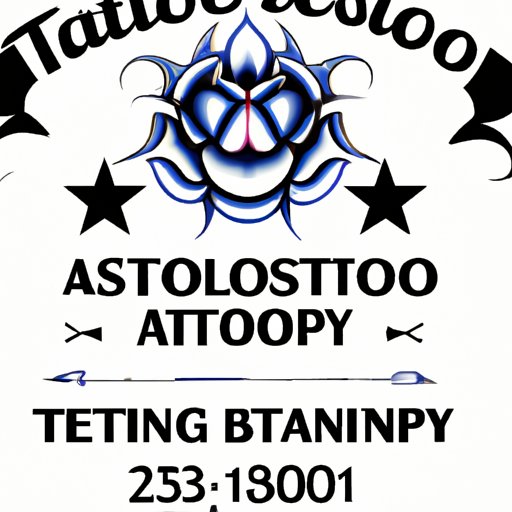Introduction
Tattoos are an increasingly popular form of self-expression, with many people looking to get inked for creative or personal reasons. For those who have a passion for tattoos and body art, becoming a licensed tattoo artist can be an exciting career path. But what does it take to become a licensed tattoo artist? This article will break down the steps to becoming a licensed tattoo artist.

Definition of a Licensed Tattoo Artist
A licensed tattoo artist is someone who has gone through the process of obtaining a professional license to perform tattooing services. In most states, this includes completing a state-approved course or apprenticeship, passing a written exam, and submitting an application to the state’s health department. Once approved, the tattoo artist can legally offer their services to clients.

Overview of Steps to Becoming a Licensed Tattoo Artist
Becoming a licensed tattoo artist requires dedication and hard work, but the rewards can be great. Here are the main steps you need to take to obtain a professional license:
- Research State Licensing Requirements
- Take a Tattooing Course or Apprenticeship
- Obtain Blood Borne Pathogens Training
- Get Necessary Supplies and Equipment
- Develop a Portfolio of Work
- Join Professional Organizations
Research State Licensing Requirements
The first step to becoming a licensed tattoo artist is to research the licensing requirements in your state. Regulations vary from state to state, so it’s important to understand the specific laws and restrictions that apply to you. You should also check local regulations, as some cities and counties may have additional rules.
Once you’ve familiarized yourself with the regulations, you should understand the application process. Depending on your state, you may need to submit an application to the health department, provide proof of education or training, and pass a written exam. You should also learn about any applicable fees and insurance requirements.

Take a Tattooing Course or Apprenticeship
In order to become a licensed tattoo artist, you must obtain formal training. Depending on your state’s regulations, this could include taking a tattooing course or completing an apprenticeship. When looking for a course or apprenticeship, make sure to find one that is accredited. This will ensure that you are receiving quality instruction and learning the necessary safety practices.
During your training, you should learn about design techniques and how to develop your own unique style. This will help you stand out as an artist and give you an edge when applying for a license. You should also learn about proper sanitation and hygiene practices, as this is essential for providing safe services.
Obtain Blood Borne Pathogens Training
In addition to general tattooing training, you should also obtain blood borne pathogens training. This type of training teaches you how to handle blood and other fluids safely and properly dispose of biohazardous waste. It also covers disease prevention and how to disinfect equipment properly.
This type of training is essential for working in the tattoo industry, as it helps protect both you and your clients from potential health risks. Make sure to choose a reputable program and keep your certification up to date.
Get Necessary Supplies and Equipment
In order to become a professional tattoo artist, you must have the necessary supplies and equipment. This includes items like needles, ink, gloves, and other safety gear. When choosing supplies and equipment, make sure to select products that are of high quality. This will ensure that your work is safe and sanitary.
You should also learn how to properly store these supplies and equipment. This will help protect them from contamination and damage. Additionally, having the right supplies and equipment will help you work efficiently and effectively.
Develop a Portfolio of Work
As a tattoo artist, it’s important to have a portfolio of your work. This will showcase your unique artistry and demonstrate your mastery of designs. When creating a portfolio, collect examples of your work that reflect your style and skill level. You should also include photos of finished pieces and sketches.
Having a portfolio of your work is essential for getting licensed, as it proves to the state that you have the necessary skills and experience to be a professional tattoo artist. It also helps you stand out from other applicants and gives you an advantage when applying for a license.
Join Professional Organizations
Finally, joining professional organizations is a great way to network with others in the field and access resources and opportunities. Professional organizations provide information on current trends and techniques, as well as educational materials and events. They also serve as a platform to connect with other professionals and further your career.
Joining a professional organization is a great way to stay informed and up-to-date on the latest developments in the industry. Additionally, it can help you build connections and open doors to new opportunities.
Conclusion
Becoming a licensed tattoo artist requires dedication and hard work, but the rewards can be great. The main steps to becoming a licensed tattoo artist include researching state licensing requirements, taking a tattooing course or apprenticeship, obtaining blood borne pathogens training, getting necessary supplies and equipment, developing a portfolio of work, and joining professional organizations.
If you’re passionate about tattoos and body art, pursue your dream of becoming a licensed tattoo artist. With the right knowledge and resources, you can make your mark in the industry and create beautiful works of art.
(Note: Is this article not meeting your expectations? Do you have knowledge or insights to share? Unlock new opportunities and expand your reach by joining our authors team. Click Registration to join us and share your expertise with our readers.)
